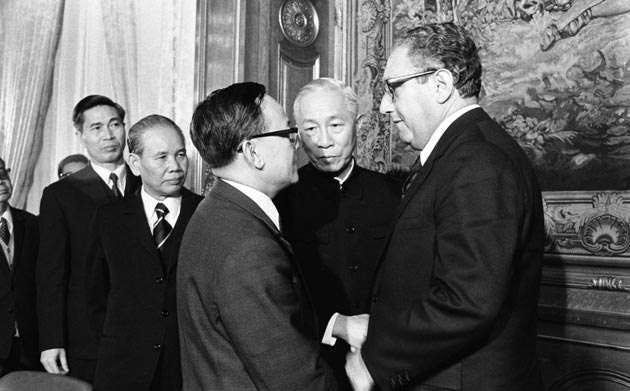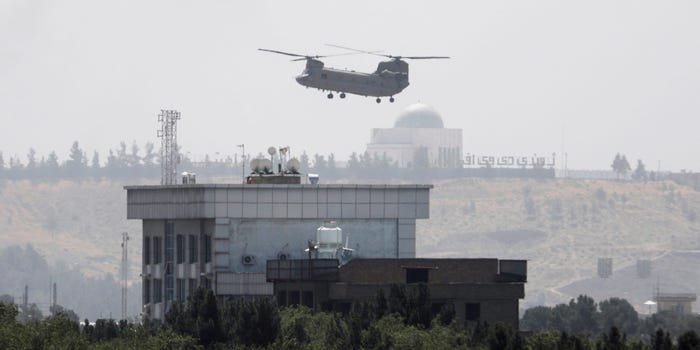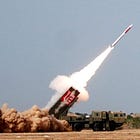Fifty Years After Saigon: Remembering the Nobility of a Betrayed Cause
We must remember not just South Vietnam's fall, but why it fell.
This essay is free, but with Premium Membership you get MORE. Join today.
by Rod D. Martin
April 30, 2025
Fifty years ago, April 30, 1975, the world watched in horror and disbelief as the last American helicopter lifted off from the rooftop of our embassy in Saigon. South Vietnam had fallen in the manner of Ernest Hemingway, “first gradually, then suddenly”: a decades-long war, a relative peace, and then a mad dash by the North Vietnamese Army that consumed the country in less than a month.
The tragedy was simply breathtaking. And horribly, horribly unnecessary.
What followed was not peace, but darkness. The swift collapse of South Vietnam, Cambodia, and Laos (turns out the Domino Theory was true) brought the subjugation of millions, and the opening act of a Communist bloodbath across Southeast Asia. At least a million were sent to the “re-education camps” in Vietnam alone. Half a million were murdered. Another two million fled this brutal night by sea, on rafts wholly unsuited for the tumultuous ocean, in wild hope that an American aircraft carrier might happen upon them. Close to half a million died in the water.
I remember standing before one of the refugees, one of the countless “boat people” who was resettled to Fort Smith, Arkansas. He was a slight, middle-aged man, with thinning hair and humble dignity. We were in the fellowship hall of my church. I was eight years old. And I remember looking up at the South Vietnamese flag on his lapel and just weeping, and saying over and over “I’m sorry, I’m just so sorry.”
We should all be so sorry.
None of that counts the genocide of Pol Pot — whom the American left had dubbed “the George Washington of Cambodia”. Over the next three years he murdered between a quarter and a third of his entire population. He would have gone right on had not even the Communists in Moscow and Hanoi been horrified (though Beijing gave him their unqualified support both before and after the massacre).
None of this had to happen. This was not the end of a war, but the culmination of betrayal — a betrayal of an ally, of a cause, and of the very principles America had defended with precious blood and treasure for eight long years.
The received wisdom is that Vietnam was a mistake, a misguided war fought in the wrong place at the wrong time. That narrative is false. The Vietnam War was part of a noble, epic struggle — the same struggle that won the Cold War and saved the whole world from a similar fate. It was a just effort to stop Communist totalitarianism and genocide from consuming yet another corner of the globe. South Vietnam was not a hopeless case. It was a fledgling republic, striving to build a free society in the shadow of Marxist tyranny and under constant assault from within and without. Its people fought with courage and resolve for more than two decades, first with our help and then — fatally — with almost none.
In many ways, the fall of Vietnam mirrored the loss of China in 1949: a long American effort thrown away at the very last through perfidy in Washington — begun and betrayed by Democrats in both cases — with ghastly, ongoing consequences. The two were even similar in this: a Christian President of China (Chiang Kai-shek) betrayed by Truman, a Christian President of South Vietnam (Ngo Dinh Diem) assassinated on orders from JFK, after both of which came the deluge.
By 1973, we had won. No, really. Richard Nixon and Henry Kissinger negotiated the Paris Peace Accords, forcing North Vietnam to accept South Vietnam’s sovereignty and halting hostilities. The terms included an ironclad U.S. guarantee not only to supply and train the ARVN (Army of the Republic of Vietnam) but to bomb North Vietnam into the Stone Age if it transgressed the treaty. The Communists agreed to this. They also agreed that no Soviet arms would replace those lost during the war, on penalty of Nixon’s aerial wrath.
American troops came home with honor, leaving behind an allied nation capable of defending itself, provided it received the continued support we’d promised. That support was a central condition of the peace. Nixon called it “peace with honor” because it represented more than withdrawal — it was a commitment, a guarantee that America would not desert its friends or allow 58,000 of its sons to have died in vain.
But with Nixon forced from office, Congress fell into the hands of men more concerned with leftist politics than principle. Nixon won 49 states in 1972. In the aftermath of Watergate, in 1974, Democrats won overwhelming Congressional majorities: almost 300 House seats, and a filibuster-proof 61 in the Senate.
This radicalized majority, driven by post-Watergate bloodlust, slashed military aid to South Vietnam by over 75%, prohibited any American military response to a massive Soviet rearmament of the North, and watched coldly as North Vietnam violated every term of the accords. They wouldn’t even send our allies tires for their Jeeps or gas for their tanks.
Deprived of ammunition, fuel, and the will of its ally, South Vietnam collapsed — not because it lacked heart, but because it was abandoned, by the same Democrat Party that had sent America’s sons to die there just ten years before.
This is the reality the left refuses to confront even half a century later. The fall of Saigon was not inevitable. It was engineered in Washington more than Hanoi. It was not a military defeat — it was a political surrender, the first of many. Over the next five years, Democrats handed 26 countries to the Communists. That’s on top of Carter’s betrayal of the Shah of Iran.
Richard Nixon understood this. Years after, in No More Vietnams, he laid out the real lessons of that conflict, lessons we ignore at our peril. He did not argue that we should never fight again. Quite the contrary. He argued that when America fights, it must fight to win — and that when we make commitments, we must keep them.
Nixon identified several hard-earned principles. First, never again should we enter a war without the will to achieve total victory. Limited wars, hamstrung by political calculations and media hysteria, are recipes for disaster. The United States must use overwhelming force early, break the enemy’s will, and end conflicts on our terms — not theirs. He rightly condemned the gradual escalation that defined the Kennedy and Johnson years, insisting that decisive action at the outset would have saved countless lives.
The same could be said for China, where decisive Soviet action in 1945 in Manchuria, fecklessly answered by Truman, set the tone for the rest of the war.
Second, we must never send our soldiers to fight unless the cause directly serves vital American interests. In this, Nixon prefigured Trump. But once engaged, we must not allow domestic politics to undercut our efforts. Unity at home is essential. Leadership must resist the temptation to bow to the transient winds of public opinion or the distortions of a hostile press.
Nixon was blunt: wars cannot be run from newsrooms. Nor, I should add, should bombing targets (or tennis court times) be selected from the Oval Office.
Third, America must support its allies fully or not at all. Partial support, tepid commitments, and shifting loyalties invite chaos and death. South Vietnam stood ready to defend itself — with our help. Once we withdrew that help, we ensured their destruction. Nixon rightly saw that as an even greater moral failure than a strategic one.
And fourth, peace is only possible through strength. The idea that we can withdraw from the world, that we can turn our backs on aggression and be left in peace, is a fantasy. Weakness invites conflict. Only credible deterrence, backed by the willingness to act, can maintain stability and peace.
These lessons, learned at tragic cost, should have guided us forward. But they were forgotten. In 2021, Joe Biden gave us a second Saigon, this time in Kabul.
Once again, a Democrat President abandoned our allies, violated our commitments, and handed victory to the forces of barbarism. Once again, desperate people clung to departing American aircraft, hoping in vain that the land of the free would not forget them. Once again, we left billions of dollars worth of weapons for our enemies and consigned countless friends to death.
It’s a very dangerous thing to be an American ally when Democrats are in power.
Biden’s withdrawal from Afghanistan was not a tragedy born of necessity. It was a choice — a deliberate reversion to the very perfidy that doomed South Vietnam. And just as in Vietnam, the consequences were immediate: a resurgent Taliban, women and girls booted from schools and reduced to chattel, jihadists emboldened, and American credibility in tatters. Kabul gave us Ukraine, and all the death that ensued.
The cause in Vietnam was just. The men who fought there — American and South Vietnamese alike — were heroes, even when they didn’t believe they were. They did not lose. They were betrayed. And those who denied them the support they needed bear responsibility for the horrors that followed.
Fifty years later, we must remember not just the fall of Saigon, but why it fell. We must honor the noble cause that was abandoned, and we must resolve never to make the same mistake again. The world does not forgive weakness, and history does not forget cowardice.
Let us say now, clearly and finally: no more Vietnams, no more Afghanistans, no more betrayals. If America is to lead, it must lead with strength, with clarity, and with resolve. Because freedom is never free — and the price of abandoning it is always paid in blood.












Thank you. A powerful piece, that should be required reading for every citizen, and potential citizens of the United States, especially those who favor the Democrat party.
Great article! I served as a Marine in Vietnam’66-‘67 and our leaders were good, our units we’ll-trained and the people we were sent to protect were good people that only want to go about their lives without the VC or the NVA stealing their young people or their food or killing their leaders.
Ho Chi Minh was a murderous, Moscow-aligned butcher, not some kind of hero. We we allied with him during WWII because he was useful in killing Japanese.
We weren’t there to seize territory. We weren’t there to gain a colony. We weren’t there to exploit their natural resources. We were there to keep the South free.